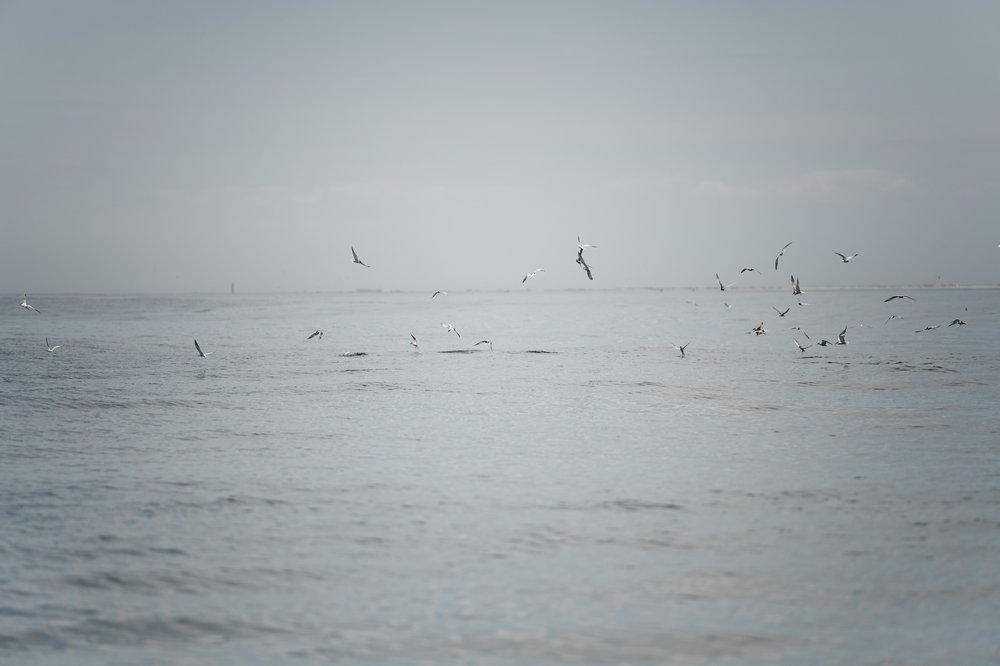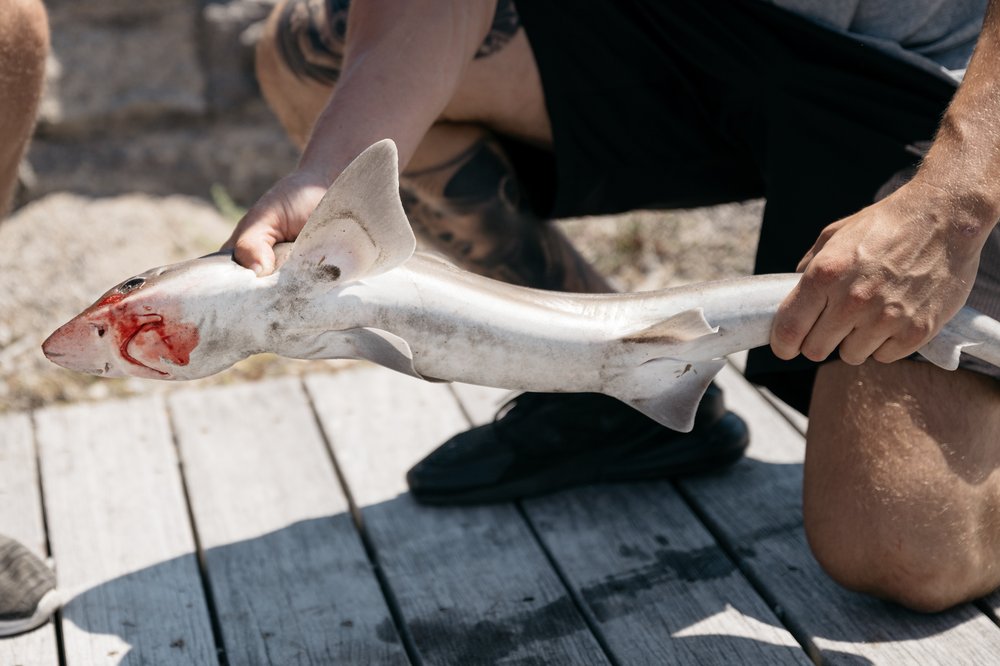On the sea and in the sky with NY's new shark patrollers
July 29, 2022, 11:35 a.m.
“They’re here, they’ve always been here, but now maybe there’s more of them." — Lt. Sean Reilly, a state police officer with the Department of Environmental Conservation.
As public safety initiatives go, tracking an apex predator presents its fair share of operational challenges.
But if the stress of their new shark-detecting duties is getting to them, our guides aren’t showing it.
“They’re here, they’ve always been here, but now maybe there’s more of them,” shrugged Lt. Sean Reilly, a state police officer with the Department of Environmental Conservation. “What are you going to do?”
Reilly makes this observation aboard a state police boat, halfway through an hourslong expedition along the languid southern coast of Fire Island, part of the enhanced shark surveillance program announced last week by Gov. Kathy Hochul.
Relying on a fleet of drones, helicopters, and police boats, the new patrols are meant to serve as an “early warning system for sharks,” Reilly notes, not unlike the Cold War-era missile-detection systems that once listened for trouble off the tip of Long Island. The multi-agency effort has pulled in state police officers, parks workers, marine biologists, and lifeguards.
At most hours of the day, swimmers at state beaches can expect to see the 17-foot police vessels patrolling a mile or so off the coast, with two law enforcement officials per watercraft, as if cruising the beat following a grisly crime.
Rumbling along the edge of Robert Moses Beach, we encounter pods of bottlenose dolphins, an osprey clutching a bait fish, and a parade of low-flying helicopters. We do not see any sharks, though this is apparently the norm. In the roughly two weeks of daily boat patrols, the state authorities have yet to spot a single shark.

That doesn’t mean they're not out here. Within 30 miles of this spot, there have been at least five confirmed shark bites this month (a reported sixth bite is now believed to have been the work of a bluefish). While none of the bites were serious, they represent a statistical oddity: prior to this summer, there were just eight confirmed shark bites in New York waters in the last century.
“It’s a pretty abnormal summer we’ve been having. In terms of history and our coast, shark interactions are pretty low,” said Chris Scott, a DEC marine biologist and in-house shark expert. “The commonality is individuals in murky water near schools of bait fish.”
Drawn closer to shore by cleaner waters and an influx of bait fish, New York’s resurgent shark population is a cause for celebration, according to Scott. But not everyone is celebrating New York’s “summer of shark.” As warming temperatures send people to the region’s beaches in record numbers, an increase in what officials describe as “negative interactions” can feel inevitable.
Who is conservation for: we’ve helped the sharks quite a bit, but there's never a time when humans are not going to be entwined in that same environment
Pat Nason, a cultural anthropologist
“There’s this deeper question of who is conservation for: we’ve helped the sharks quite a bit, but there's never a time when humans are not going to be entwined in that same environment,” said Pat Nason, a cultural anthropologist and New York-based boat captain who studies the relationship between humans and animals, including sharks. “There is a conflict that’s going to continue, and there's no easy answer.”
The meeting of man and shark has prompted new educational campaigns, backed by public messaging that can feel, well, murky. As researchers insist that shark bites represent an infinitesimal threat to beachgoers, those in charge of the waters have reacted to the presence of sharks with heavy-handed beach closures – a disproportionate response, according to some observers.
On numerous occasions this summer, New York City Parks officials have blocked swimming on Rockaway Beach for an entire day over a shark sighting – including during a heat wave this past Saturday, when more than 100,000 packed the beach. Shorter beach closures have happened dozens of times at Robert Moses State Park and Jones Beach in recent weeks.
George Gorman, the Long Island regional director of the State Parks Department, said it pays to be cautious. “Once we have a report of a possible shark sighting, we immediately clear the waters so we can go investigate what’s out there: Is there a dolphin? Is there another marine mammal?”

In decades past, shark sightings would prompt local authorities – including the NYPD and the Coast Guard – to grab rifles and lure their target to the surface with chunks of lamb before firing down at them from helicopters. But new technology, along with a renewed appreciation for sharks’ integral role in the marine ecosystem, has prompted a more humane approach.
Since the start of summer, the state has certified 15 lifeguards as drone operators, funding additional overtime to pay for the added coverage. State officials would not disclose the full price tag of the shark patrols.
The nearby town of Hempstead, which oversees Lido Beach, has also invested in its own jet ski and drone surveillance program. In New York City, the NYPD’s Aviation Unit conducts “random and routine beach and shoreline surveys for shark activity,” according to a spokesperson, who declined to answer further questions about the practice.
Colin Hickey, a state lifeguard of 18 years, is one of a number of state employees who recently received drone certifications. After a few practice runs, he was pressed into action on Monday, when a lifeguard spotted a shark swimming off Robert Moses Beach.
“It’s basically like a video game controller,” said Hickey. “I’ve been literally training for this moment my entire life.”
In this case, he didn’t find anything, allowing lifeguards to reopen the waters to swimmers after an hour. But despite the green flags, some beachgoers remained wary.
“Folks have their jitters,” Hickey said. “We get a lot of people asking us if there are sharks in the water, and the best response we can give is that there are, but we haven’t seen them. So please just enjoy the day, because more than likely it’s not going to come around here.”
Don't panic, but more sharks are circling NYC beaches Another lifeguard attacked by shark off of Fire Island, officials say